Why Do Some Transvaginal Mesh Implant Devices Fail?
- Last Updated: June 12th, 2025

Attorney Jessica Paluch-Hoerman, founder of TruLaw, has over 28 years of experience as a personal injury and mass tort attorney, and previously worked as an international tax attorney at Deloitte. Jessie collaborates with attorneys nationwide — enabling her to share reliable, up-to-date legal information with our readers.
Legally Reviewed
This article has been written and reviewed for legal accuracy and clarity by the team of writers and legal experts at TruLaw and is as accurate as possible. This content should not be taken as legal advice from an attorney. If you would like to learn more about our owner and experienced injury lawyer, Jessie Paluch, you can do so here.
Fact-Checked
TruLaw does everything possible to make sure the information in this article is up to date and accurate. If you need specific legal advice about your case, contact us by using the chat on the bottom of this page. This article should not be taken as advice from an attorney.
Key takeaways:
- Transvaginal mesh implant devices provide support for weakened pelvic tissues, but the FDA halted sales for pelvic organ prolapse repair due to major safety concerns.
- The FDA now requires rigorous evaluation of transvaginal mesh implant devices as they can cause serious complications including chronic pain, nerve damage, and additional surgical interventions.
- Alternatives to transvaginal mesh implant devices exist, and patients should discuss all treatment options with healthcare providers before choosing surgical mesh procedures.
Why Do Some Transvaginal Mesh Implant Devices Fail?
Question: Why do some transvaginal mesh implant devices fail?
Answer: Transvaginal mesh implant devices can fail due to several factors, such as inflammation from the body’s reaction to foreign materials, mesh contraction or shrinkage over time, improper surgical placement, and other adverse health effects.
Vaginal mesh implant devices were designed to provide additional support to weakened vaginal walls and pelvic floor structures but have been associated with numerous complications including mesh erosion, severe pelvic pain, infection, and organ perforation.
On this page, we’ll answer this question in further depth, major causes of transvaginal mesh implant device failure, complications associated with defective transvaginal mesh implants, and much more.

How Transvaginal Mesh Devices Are Used in Medical Procedures
Transvaginal mesh implants were developed to treat common female pelvic floor disorders that affect millions of women.
These surgical mesh devices are implanted through the vagina to reinforce weakened vaginal tissue in cases of pelvic organ prolapse where organs such as the bladder, uterus, or rectum drop from their normal position.
Similar mesh products are also used to create supportive slings for the urethra to treat stress urinary incontinence.
Despite FDA warnings dating back to 2011, many of these devices continued to be marketed and implanted without adequate testing or patient information about potential risks.
If you or someone you love has experienced complications from a transvaginal mesh implant, you may qualify to seek compensation for your injuries.
Contact TruLaw using the chat on this page to receive an instant case evaluation that can determine your eligibility to join others in filing a Transvaginal Mesh Lawsuit today.
Table of Contents
How Can A Transvaginal Mesh Attorney from TruLaw Help You?
Our Transvaginal Mesh attorney at TruLaw is dedicated to supporting clients through the process of filing a Transvaginal Mesh lawsuit.
With extensive experience in product liability cases, Jessica Paluch-Hoerman and our partner law firms work with litigation leaders and medical experts to prove how defective mesh implants caused you harm.
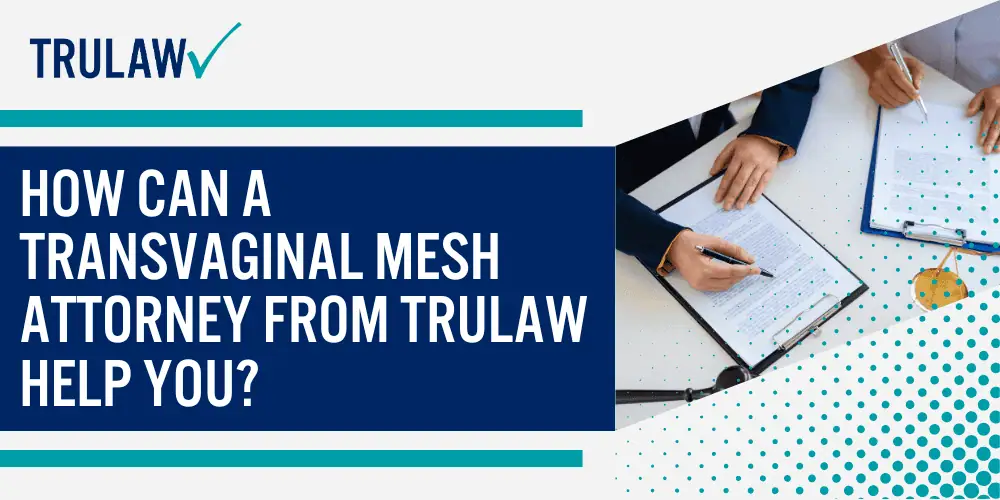
TruLaw focuses on securing compensation for medical expenses, revision surgeries, pain and suffering, lost income, and other damages resulting from your transvaginal mesh injuries.
We understand the physical and emotional toll that Transvaginal Mesh complications have on your life and provide the personalized guidance you need when seeking justice.
Meet the Lead Transvaginal Mesh Attorney at TruLaw
Meet our lead Transvaginal Mesh attorney:
- Jessica Paluch-Hoerman: As founder and managing attorney of TruLaw, Jessica brings her experience in product liability and personal injury to her client-centered approach by prioritizing open communication and personalized attention with her clients. Through TruLaw and partner law firms, Jessica has helped collect over $3 billion on behalf of injured individuals across all 50 states through verdicts and negotiated settlements.
How much does hiring a Transvaginal Mesh lawyer from TruLaw cost?
At TruLaw, we believe financial concerns should never stand in the way of justice.
That’s why we operate on a contingency fee basis—with this approach, you only pay legal fees after you’ve been awarded compensation for your injuries.
If you or a loved one experienced pain, bleeding, infection, organ perforation, mesh erosion, or other complications from transvaginal mesh implants, you may be eligible to seek compensation.
Contact TruLaw using the chat on this page to receive an instant case evaluation and determine whether you qualify to join others in filing a Transvaginal Mesh lawsuit today.
Major Causes of Transvaginal Mesh Device Failure
Transvaginal mesh implants were designed to provide support to organs in the pelvic region that have become displaced due to weakened tissues.
Despite being FDA approved for certain uses, many of these devices have demonstrated serious safety and effectiveness concerns requiring ongoing surgical management after implantation.
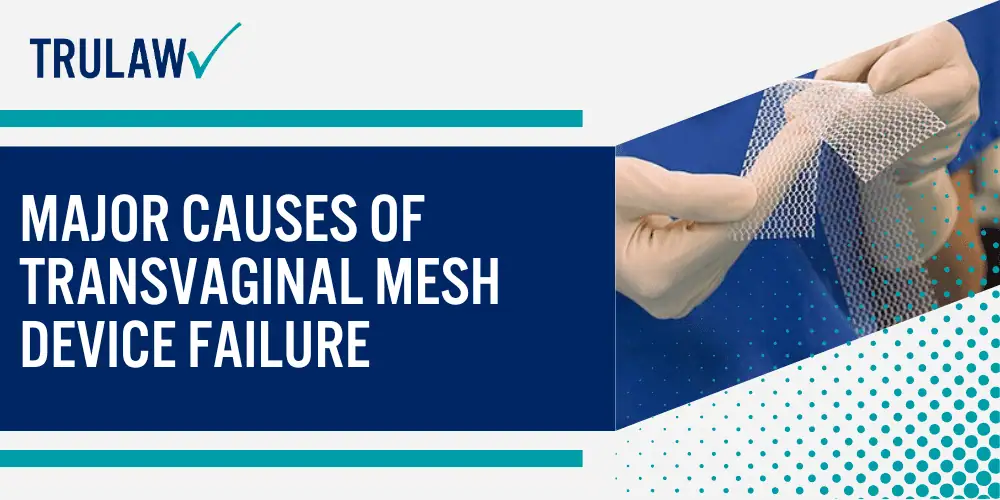
Originally, many mesh devices were cleared through a less rigorous approval process than is now required for these implants.
Design Flaws in Pelvic Mesh Implant Devices
Manufacturers like American Medical Systems developed mesh products without sufficient premarket approval application data to fully understand long-term outcomes.
Early clinical trials for mesh products used to treat POP (pelvic organ prolapse) were often limited in scope and duration, failing to identify complications that would emerge years later.
In 2016, the FDA reclassified transvaginal mesh for POP repair as Class III (high-risk) devices, requiring more rigorous testing before approval.
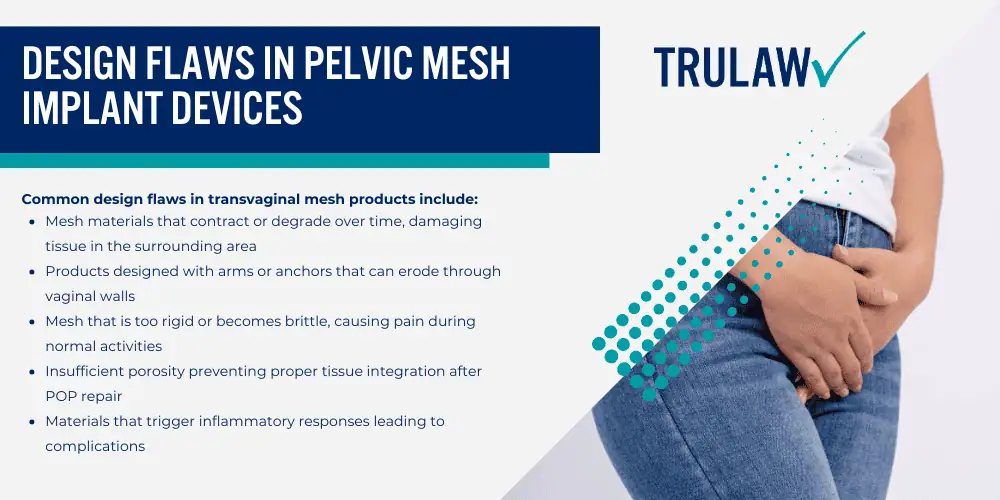
Common design flaws in transvaginal mesh products include:
- Mesh materials that contract or degrade over time, damaging tissue in the surrounding area
- Products designed with arms or anchors that can erode through vaginal walls
- Mesh that is too rigid or becomes brittle, causing pain during normal activities
- Insufficient porosity preventing proper tissue integration after POP repair
- Materials that trigger inflammatory responses leading to complications
Many patients have reported that the mesh itself caused more problems than the condition it was meant to treat.
Surgical Technique Issues in Transvaginal Mesh Surgery
Even when mesh devices performed as designed, surgical technique problems have contributed significantly to complications in many women.
Procedures like midurethral sling placement for SUI repair require precise positioning to avoid organ damage.
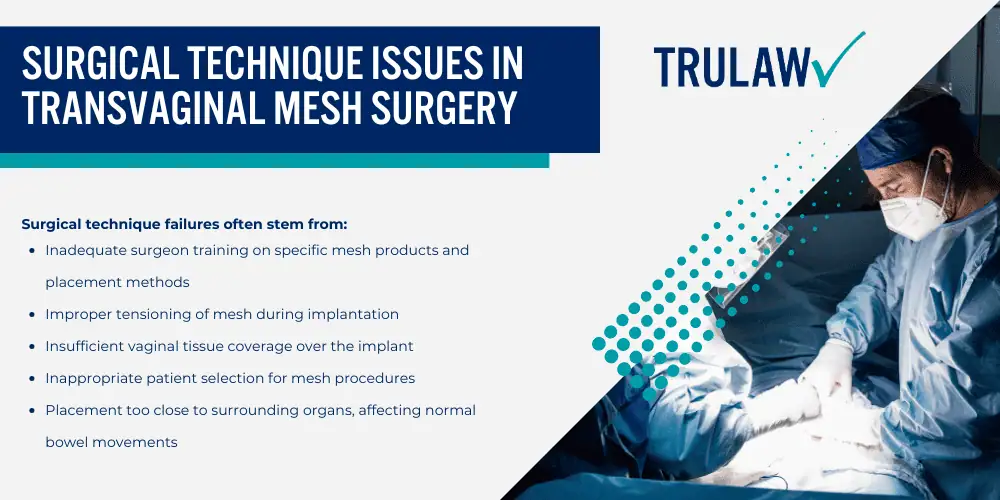
Surgical technique failures often stem from:
- Inadequate surgeon training on specific mesh products and placement methods
- Improper tensioning of mesh during implantation
- Insufficient vaginal tissue coverage over the implant
- Inappropriate patient selection for mesh procedures
- Placement too close to surrounding organs, affecting normal bowel movements
The combination of product design issues and surgical technique problems has resulted in thousands of women requiring revision surgeries or complete mesh removal.
Unlike SUI repair procedures using midurethral slings, which have better long-term outcomes, transvaginal mesh for POP repair has demonstrated significantly higher complication rates.
The FDA continues to monitor mesh products through post-market surveillance to identify potential safety risks that weren’t apparent during initial approval processes.
Identifying Signs of Transvaginal Mesh Implant Failure
Transvaginal mesh implants were marketed as an effective solution for repairing weakened tissue in the pelvic floor.
Recognizing the signs of mesh failure early can help patients seek prompt medical intervention before complications worsen.

After an FDA advisory committee meeting in 2011, the agency discovered that transvaginal mesh complications were neither rare nor unpredictable as previously thought.
Warning Signs for Patients with Pelvic Organ Prolapse
The FDA issued warnings that patients who received mesh for pelvic organ prolapse repair should be vigilant for specific symptoms that may indicate mesh failure.
Pain during everyday activities, especially heavy lifting or bending, often signals mesh erosion or contraction.
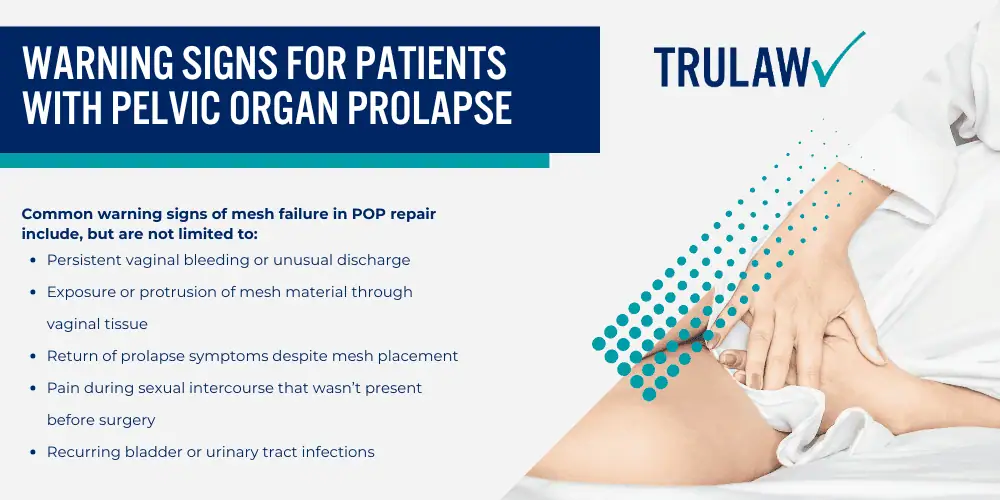
Common warning signs of mesh failure in POP repair include, but are not limited to:
- Persistent vaginal bleeding or unusual discharge
- Exposure or protrusion of mesh material through vaginal tissue
- Return of prolapse symptoms despite mesh placement
- Pain during sexual intercourse that wasn’t present before surgery
- Recurring bladder or urinary tract infections
When mesh properties like pore size are inadequate, the body’s inflammatory response can lead to serious problems, including infection and organ perforation.
An exposed piece of mesh may be visible or palpable during examination, confirming mesh erosion through vaginal tissue.
Complications in Stress Urinary Incontinence Treatments
Mini slings and other mesh products used for stress urinary incontinence have shown different complication profiles than those used for POP repair.
In 2019, the FDA announced stronger regulations for mesh manufacturers after determining that available products had not demonstrated reasonable assurance of safety and effectiveness.
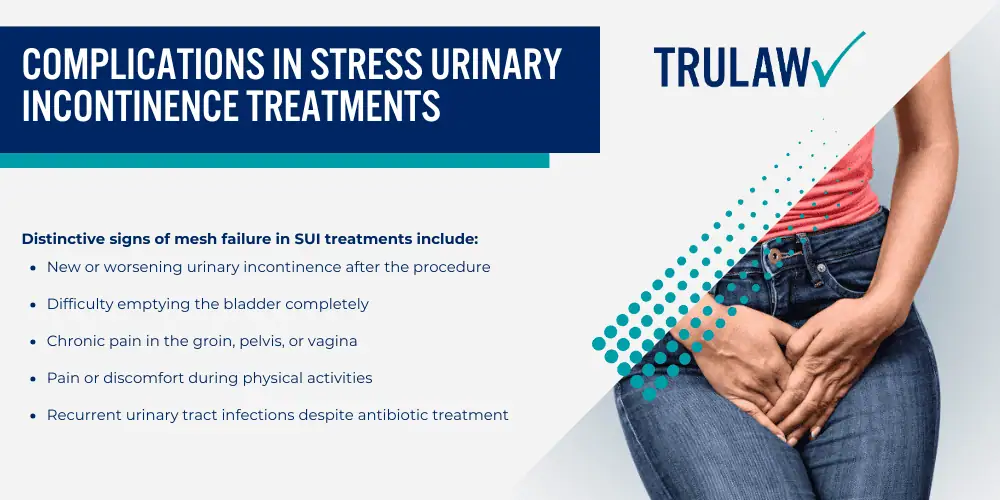
Distinctive signs of mesh failure in SUI treatments include:
- New or worsening urinary incontinence after the procedure
- Difficulty emptying the bladder completely
- Chronic pain in the groin, pelvis, or vagina
- Pain or discomfort during physical activities
- Recurrent urinary tract infections despite antibiotic treatment
Mesh complications may develop immediately after surgery or appear years later, making ongoing awareness essential for patients.
When mesh used for SUI treatment fails, many patients report a combination of pain and recurring incontinence that significantly impacts their quality of life.
Patients experiencing any of these symptoms should consult with their healthcare provider promptly, as addressing mesh complications early often leads to better outcomes.
TruLaw: Accepting Clients for the Transvaginal Mesh Lawsuit
Transvaginal mesh lawsuits are being filed by women across the country who suffered serious complications from pelvic mesh implants used to treat pelvic organ prolapse and stress urinary incontinence.
TruLaw is currently accepting clients for the Transvaginal Mesh lawsuit.
A few reasons to choose TruLaw for your Transvaginal Mesh lawsuit include:
- If We Don’t Win, You Don’t Pay: The Transvaginal Mesh lawyers at TruLaw and our partner firms operate on a contingency fee basis, meaning we only get paid if you win.
- Expertise: We have decades of experience handling product liability cases similar to the Transvaginal Mesh lawsuit.
- Successful Track Record: TruLaw and our partner law firms have helped our clients recover billions of dollars in compensation through verdicts and negotiated settlements.
If you or a loved one suffered pain, infection, bleeding, organ damage, or other complications after receiving a transvaginal mesh implant, you may be eligible to seek compensation.
Contact TruLaw using the chat on this page to receive an instant case evaluation that can determine if you qualify for the Transvaginal Mesh lawsuit today.
Transvaginal Mesh Lawsuit Frequently Asked Questions
-
Why do some transvaginal mesh implant devices fail?
Transvaginal mesh implant devices can fail due to several factors, such as inflammation from the body’s reaction to foreign materials, mesh contraction or shrinkage over time, improper surgical placement, and other adverse health effects.
Transvaginal mesh implant devices were designed to provide additional support to weakened vaginal walls and pelvic floor structures but have been associated with numerous complications including mesh erosion, severe pelvic pain, infection, and organ perforation.
-
What is the current status of lawsuits related to transvaginal mesh implant devices?
Numerous lawsuits have been filed alleging transvaginal mesh implant devices caused complications like chronic pain and nerve damage.
Manufacturers, including Boston Scientific, have faced allegations of marketing products as safe despite FDA warnings issued in 2011 about potential risks.
Many cases have resulted in significant settlements for affected patients.
-
How are transvaginal mesh implant devices surgically placed?
During transvaginal mesh implantation, surgeons typically use laparoscopic techniques, inserting instruments through small incisions.
The mesh is carefully attached to the vaginal walls and sometimes to the sacrum, suspending the vagina or cervix back into its normal anatomical position to treat conditions like pelvic organ prolapse.
-
What is the expected lifespan of transvaginal mesh implant devices?
Non-absorbable transvaginal mesh implant devices remain in the body indefinitely, though they may gradually degrade over time.
These devices provide permanent reinforcement for pelvic organs.
Some mesh types are absorbable and will naturally dissolve while losing structural strength over a predetermined period.
-
What types of materials are used in transvaginal mesh implant devices for prolapse?
Transvaginal mesh implant devices for prolapse repair come in several varieties:
- Allografts (from human cadavers)
- Xenografts (from animal tissues like porcine or bovine)
- Autografts (using the patient’s own tissue)
- Synthetic meshes (which can be either absorbable or non-absorbable depending on treatment goals)
-
What are common complications associated with transvaginal mesh implant devices?
Complications from transvaginal mesh implant devices may include chronic pelvic pain, mesh erosion through vaginal tissues, infection, urinary problems, and painful intercourse.
Some patients experience nerve damage, organ perforation, or recurrence of prolapse or incontinence, potentially requiring revision surgeries or complete mesh removal.
-
Are there alternatives to using transvaginal mesh implant devices for pelvic organ prolapse?
Alternative treatments for pelvic organ prolapse include non-surgical options like pelvic floor physical therapy and pessary devices.
Surgical alternatives involve native tissue repairs that use the patient’s own ligaments and tissues rather than mesh.
These approaches may reduce risks associated with transvaginal mesh implant devices while still addressing prolapse symptoms.

Managing Attorney & Owner
With over 25 years of legal experience, Jessica Paluch-Hoerman is an Illinois lawyer, a CPA, and a mother of three. She spent the first decade of her career working as an international tax attorney at Deloitte.
In 2009, Jessie co-founded her own law firm with her husband – which has scaled to over 30 employees since its conception.
In 2016, Jessie founded TruLaw, which allows her to collaborate with attorneys and legal experts across the United States on a daily basis. This hypervaluable network of experts is what enables her to share the most reliable, accurate, and up-to-date legal information with our readers!
Additional Transvaginal Mesh Lawsuit resources on our website:
Here, at TruLaw, we’re committed to helping victims get the justice they deserve.
Alongside our partner law firms, we have successfully collected over $3 Billion in verdicts and settlements on behalf of injured individuals.
Would you like our help?
At TruLaw, we fiercely combat corporations that endanger individuals’ well-being. If you’ve suffered injuries and believe these well-funded entities should be held accountable, we’re here for you.
With TruLaw, you gain access to successful and seasoned lawyers who maximize your chances of success. Our lawyers invest in you—they do not receive a dime until your lawsuit reaches a successful resolution!
AFFF Lawsuit claims are being filed against manufacturers of aqueous film-forming foam (AFFF), commonly used in firefighting.
Claims allege that companies such as 3M, DuPont, and Tyco Fire Products failed to adequately warn users about the potential dangers of AFFF exposure — including increased risks of various cancers and diseases.
Depo Provera Lawsuit claims are being filed by individuals who allege they developed meningioma (a type of brain tumor) after receiving Depo-Provera birth control injections.
A 2024 study found that women using Depo-Provera for at least 1 year are five times more likely to develop meningioma brain tumors compared to those not using the drug.
Suboxone Tooth Decay Lawsuit claims are being filed against Indivior, the manufacturer of Suboxone, a medication used to treat opioid addiction.
Claims allege that Indivior failed to adequately warn users about the potential dangers of severe tooth decay and dental injuries associated with Suboxone’s sublingual film version.
Social Media Harm Lawsuits are being filed against social media companies for allegedly causing mental health issues in children and teens.
Claims allege that companies like Meta, Google, ByteDance, and Snap designed addictive platforms that led to anxiety, depression, and other mental health issues without adequately warning users or parents.
Transvaginal Mesh Lawsuits are being filed against manufacturers of transvaginal mesh products used to treat pelvic organ prolapse (POP) and stress urinary incontinence (SUI).
Claims allege that companies like Ethicon, C.R. Bard, and Boston Scientific failed to adequately warn about potential dangers — including erosion, pain, and infection.
Bair Hugger Warming Blanket Lawsuits involve claims against 3M — alleging their surgical warming blankets caused severe infections and complications (particularly in hip and knee replacement surgeries).
Plaintiffs claim 3M failed to warn about potential risks — despite knowing about increased risk of deep joint infections since 2011.
Baby Formula NEC Lawsuit claims are being filed against manufacturers of cow’s milk-based baby formula products.
Claims allege that companies like Abbott Laboratories (Similac) and Mead Johnson & Company (Enfamil) failed to warn about the increased risk of necrotizing enterocolitis (NEC) in premature infants.
Here, at TruLaw, we’re committed to helping victims get the justice they deserve.
Alongside our partner law firms, we have successfully collected over $3 Billion in verdicts and settlements on behalf of injured individuals.
Would you like our help?
